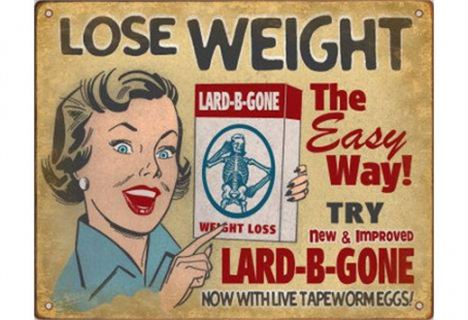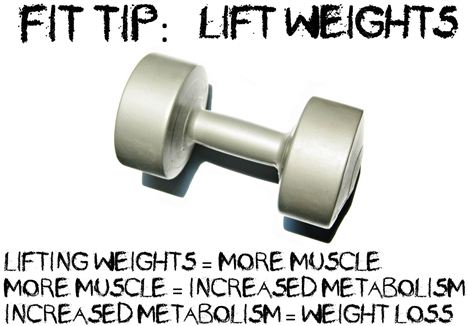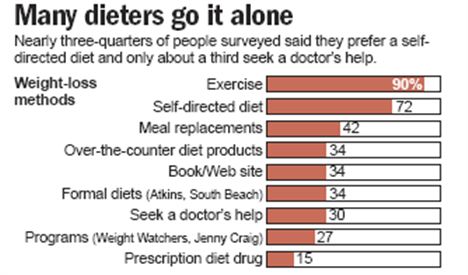WE'RE never recommended to self-diagnose when it comes to our personal health. We should always consult a professional before taking any action.
Most people who think they need to lose weight, women in particular, actually don't. What they need is to erase the whole idea from their mind set.
For some reason, however, there's one exception where people seem to be masters at diagnosing and finding cures for themselves - weight management.
It's a dangerous game to play.
Getting this wrong can be as bad as taking the wrong medications. Even more confusing are the diet gurus, who have plenty of advice, but rarely about our health. After all, their focus isn't long term but more about quick, simple and best-selling outcomes.
Another thing I've realised in this area is that many people only half listen to advice anyway. They simply focus on the bits they want to hear, jumping on the latest trend without doing any proper research.
Take the current fad for low carbohydrate diets.
I can't count the number of times I've met people whose culinary content is chicken, and chicken alone. Sure, this is a diet that will lose you weight, but at what price? Do you know the effects of cutting out carbohydrates, and therefore vital vitamins and minerals, on your brain in the long run? No, you don't. That's not so fun to read about perhaps.
Don't get me wrong, though. Of course I'm not saying eating doughnuts for breakfast (believe it or not, I actually had a client who did exactly that) is a winning concept either.
However, cutting down on so-called simple carbohydrates such as white pasta, white bread and refined sugar is not the same thing as going totally protein. Cutting down means eating wholegrain carbs and increasing your intake of vegetables, berries and fruits.
On the other hand, I've had some more normal clients, who tell me they've finally "come off sugar".
When I've gone into detail, this means they've replaced coke with fruit juice, chocolate bars with breakfast biscuits, coco pops with granola... you get the point. They've swapped obvious sugar for other sugar, which happens to be packed and marketed as a health product.
When I suggest that properly coming off sugar means drinking water, eating carrots or berries as a sweet snack, and plain nuts and oats as your breakfast cereal, they've looked at me as if I've come from a different planet. It's a sad indication of how deeply rooted the sugar epidemic really is.
The point of this column isn't to go into detail on what to eat and not, though. I want to keep things as simple as possible so I'll give you one piece of general advice. Regardless of your weight and fitness goals, cut down on refined sugar.
 Regardless of your weight and fitness goals, cut down on refined sugar
Regardless of your weight and fitness goals, cut down on refined sugar
Endless research suggests refined sugar has an inflammatory effect on the body, negatively affects our heart, metabolism, recovery, brain and so on. It plainly ruins what you are trying to achieve when you are training.
Compared to the jungle of contradictory diet tips out there, this is very simple advice to follow. Yet, some of us are going to keep buying into every net idea about magical diet formulas with the promise that we'll lose a stone in a week. The weight loss industry is really that powerful. But hang on, read that one more time. A stone in a week?
Given that we're not talking about professional athletes or fighters who need to cut weight for a competition, but ordinary overweight people, this is an utterly ludicrous transformation.
Of course, if you only eat 50 grams of green vegetables a day or, worse, completely stop eating, you'll obviously drop a massive amount of weight. I think one of the biggest problems when it comes to diet is our obsession with weight loss.
Most people who think they need to lose weight, women in particular, actually don't. What they need is to erase the whole idea from their mind set.
Not only is it unhealthy and can end up seriously damaging our health, but the way most people train to lose weight is also counterproductive. It often ends up burning muscle mass, slowing down the metabolism and weakening the immune system.
 "The weight loss industry is really that powerful."
"The weight loss industry is really that powerful."
Unless we're talking about people who are underweight or chronically overweight - people who need to be monitored by professionals - body weight is very seldom the problem. Instead the issue is body composition; the balance between muscle mass, body fat, bones, tissue and visceral fat.
That doesn't sound anywhere near as exciting as a 14-day miracle diet that comes with free abs, does it? Honestly though, I've never met anyone who's decided to stop worrying about their weight, while rethinking their diet, committing to lifting some weights (and reducing the hours they spend on the treadmill), complain that they didn't give the desired results.
And that includes clients whose only wish was to see the pounds come off.
To conclude, people who need to lose weight for health reasons should see a professional, not jump on the latest diet and training trends. Women, in general, must stop focusing on losing weight and building some muscles. Lastly, everyone should to stop eating sugar, or at least radically cut down. Isn't that simple enough?
 "Women, in general, must stop focusing on losing weight and building some muscles."
"Women, in general, must stop focusing on losing weight and building some muscles."
Jenny has competed in both grappling and pro wrestling, around Europe and the US. She is also a qualified level 3 personal trainer with a level 3 nutrition qualification. For more information, please visit www.sjodintraining.co.uk. You can follow Jenny on Twitter @jennysjdin.




